Ryan Wallman recently make a few hysterically true marketing predictions for 2019, including “Marketers will continue to ignore all consumers over the age of 35, unless someone discovers a way to put these consumers on the blockchain.”
Baby Boomers control 70% of disposable income in the US, spend close to 50% of consumer products dollars, and have greater buying power in 119 of the top 123 CPG categories. Yet, only 5% of advertising dollars are directed at them.
That’s not even accounting for Gen X, another generation completely overlooked in the myopic pursuit of brands trying to engage Millennials and Generation Z.
Advertising has a twin legacy of ageism in the workplace and poor stereotypes of aging in marketing campaigns that represent a huge missed opportunity.
I thought these observations from Kim Walker of the Silver Group were interesting:
“The belief that seniors are all about hearing aids, spectacles and retirement is absolute bullshit…
“If the opportunity is so big, why aren’t there more agencies or groups that are focused on it? It’s the million dollar question. The reason is that it’s just not cool.
“If you look at the average age of marketing and advertising people in the UK and Australia it’s 33, and it’s very hard to get 33-year-olds excited about selling to 65-year-old.”
Advertising pundit Cindy Gallop addressed this recently as well:
“The ad industry is an extremely ageist industry. When you have older people creating, producing, and approving ads, the problem is easily solved.”
Here are a few related cartoons I’ve drawn over the years:
“Marketing to Generation Z” March 2015
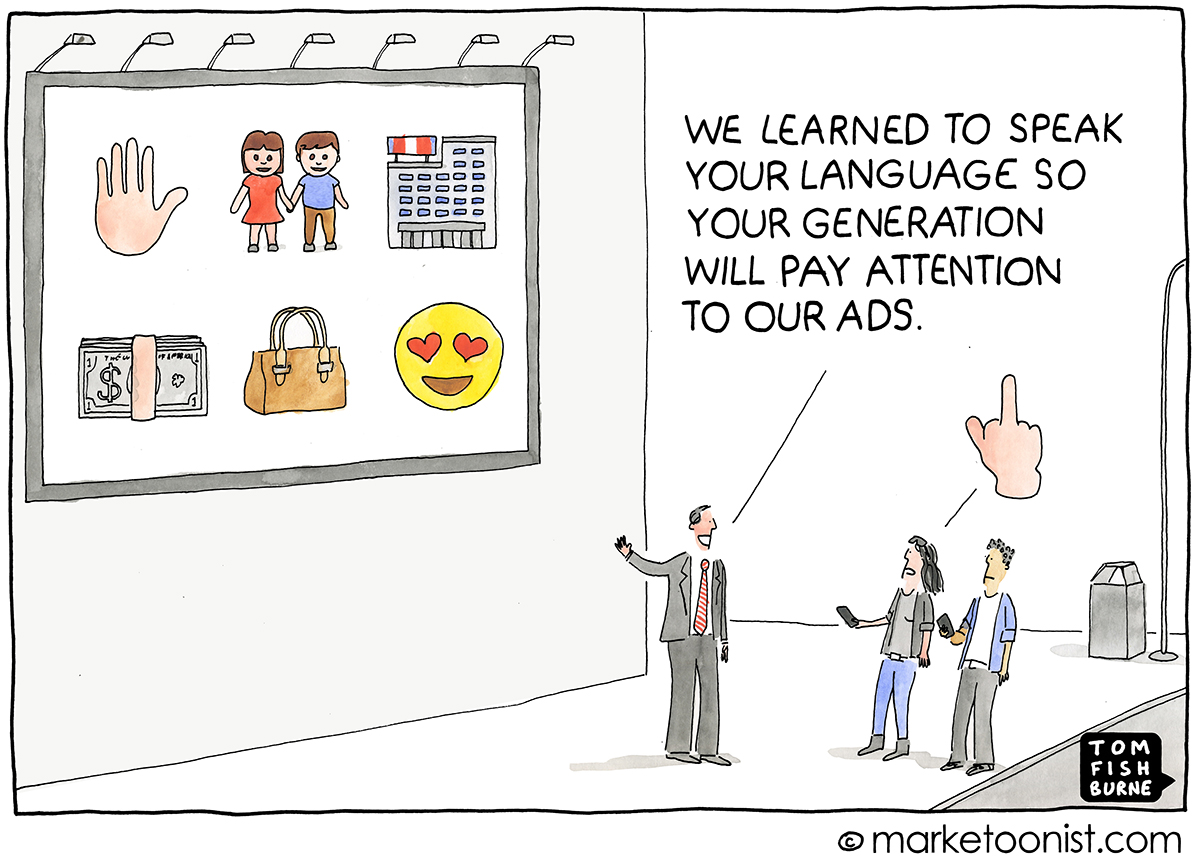
“Marketing to Younger Generations” August 2015
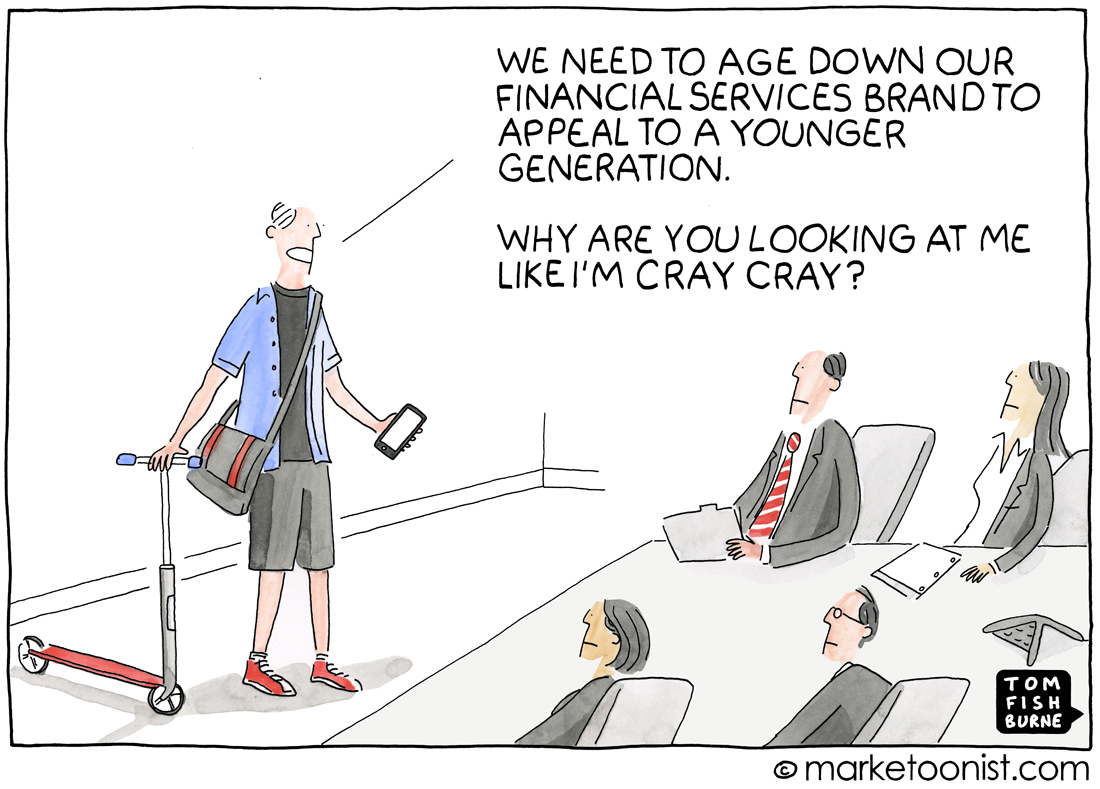
And this really old cartoon I drew over 15 years ago.
“The Market Research Zoo” June 2003
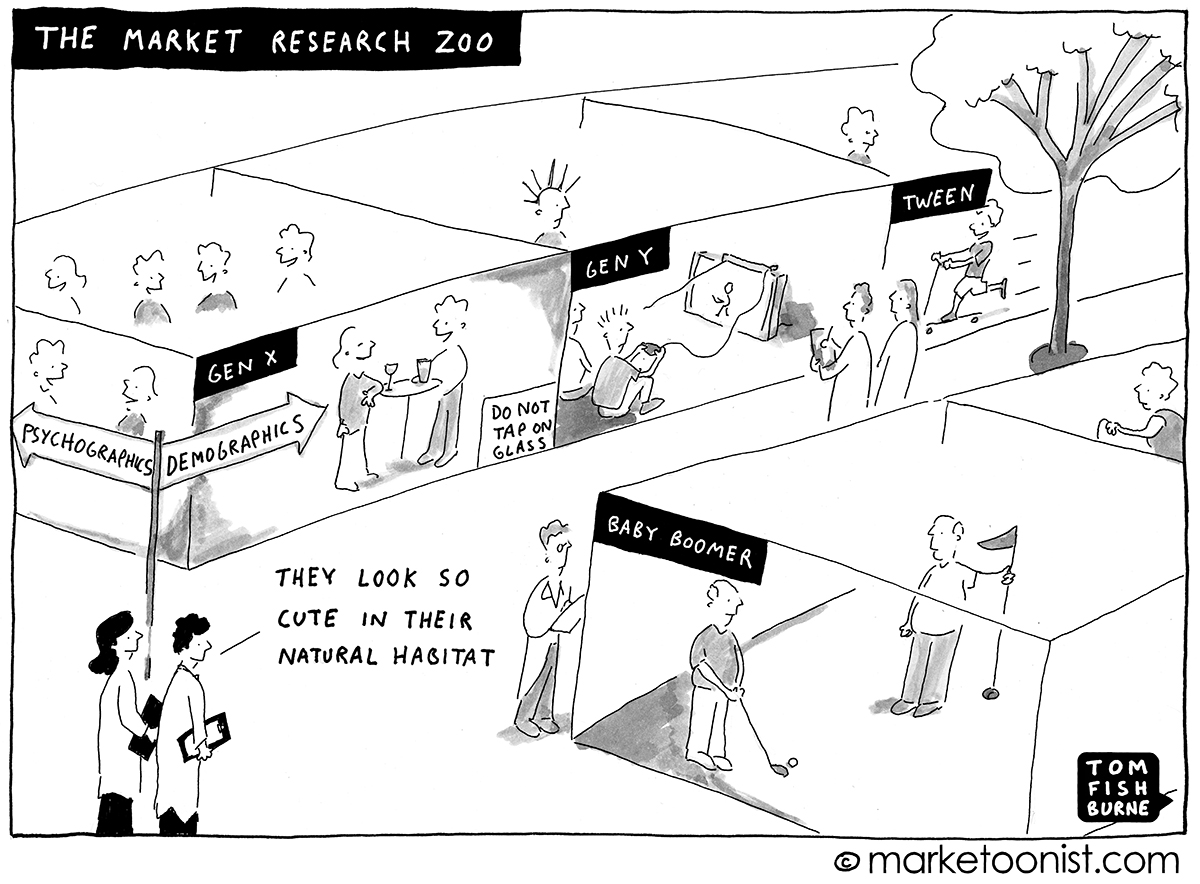
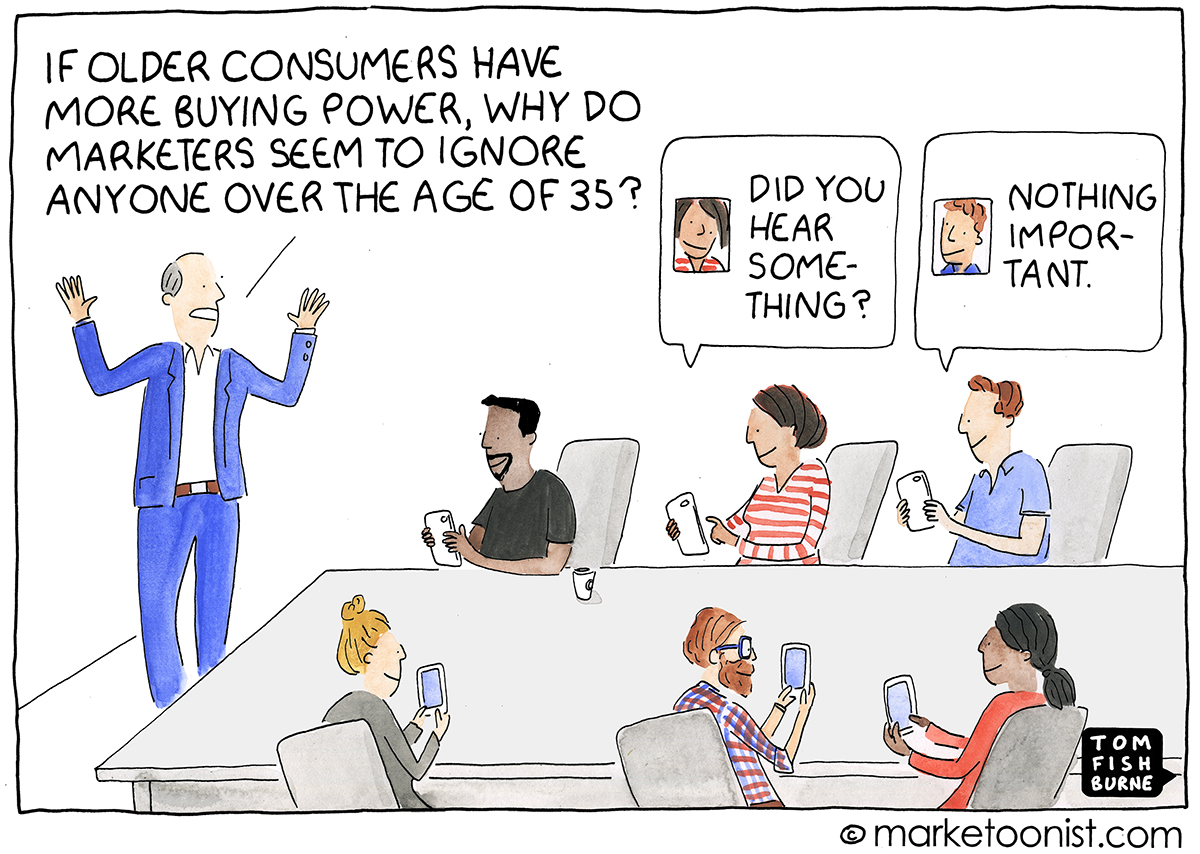
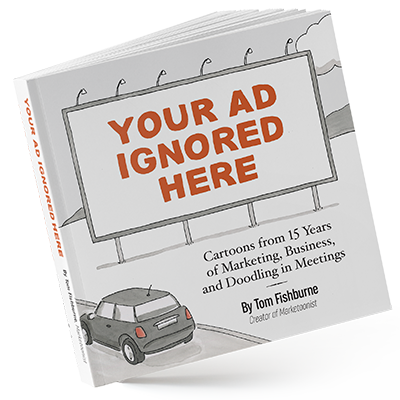
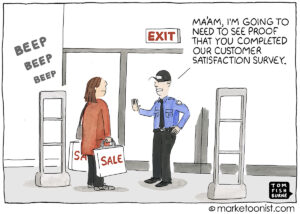
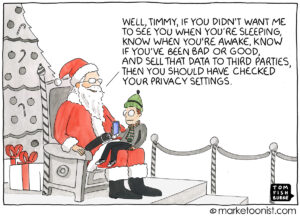
Rebecca Hughes says
I agree about the discrepancy between marketer age and audience. But i also know that my parents and their friends are more brand-loyal than younger generations.
My dad has had Hondas for 30 years, every TV a Sony for at least 20, had never changed cell phone providers or cable company. His shirts are 2 brands, and he buys Rockport shoes for everything but sport. He even has a standard list of brands to use for Christmas gifts. He doesn’t own a pair of jeans, and drinks Miller beer.
As a marketer, am i going to try to convince him to try UntuckIt shirts? Or a mid-price wine? Or Fiat cars? Or go after the 20-something college grad office worker i know is going to be open to trying something new, and has a preference for casual clothes on weekends, drinks a lot of wine, and lives in a city where parking is tight?
In other words, isn’t it plausible that part of the lack of marketing to older audiences that they are harder to persuade to try new brands, versus younger consumers who are looking for brand affinity with their “identity”, which means they are more flexible with their disposable income- but thus are harder to reach without aggressive, highly targeted marketing?
Felix says
Humans are animals of habit, but to assume older people aren’t open to trying out stuff is not based on facts. The question is, how do you nudge someone. Certainly not easy on the things that work fine. The so-so things, and the stuff you change due to ageing is where the money is at.
Sure it’s easier to convince a 20yo where not to spend the money they don’t have yet. But you’re gonna make much more by changing the spending patterns of 60yo ppl
Suzanne Pecore says
I have to reply to Rebecca – as a 65-year-old, I have to say your post was rife with stereotypes based on an n of 1 (your dad). As research professionals, shouldn’t we do the research to prove our assumptions? Given the sheer number of baby boomers, I think it’s hard to classify us all as one type of consumer.
But I’ll also agree with Bernie – I’m happy to be off the radar of ad-types as I move into a condo in a new city, embrace my all electric car + transit, drink good wine and whiskey, and shop for clothes in trendy boutiques I find as I travel the globe. I prefer to spend my disposable income where I want, and not as marketers tell me to.
Carlos Pacheco says
The point here wasn’t ‘don’t advertise to the young’, it’s about the share of noise that they get compared to the buying power of older demographics.
I’m not convinced that a brand that appeals and is aimed at a younger audience gets etched in or remains part of that individual’s life.
Nees and priorities change. Speaking anecdotally, every brand I’ve adopted in my forties I wasn’t at all interested in or couldn’t afford in my youth.
Verne says
Hmm. Rebecca, another marketer using their own market research of 1 to guide strategy…….I’m 60 years old, and I am buying into brands I would have never imagined. Baby boomers are leading the way in purchase of smart home products, for instance
Andy Wandell says
That’s if you assume everyone in your dads generation is the same. The only thing that unites a generation is their years on the planet. Their experiences, backgrounds, cultural norms and relationships are all multi variable.
Mike James says
How or why do you think that your father represents all men (which is a group of hundreds of millions of people from 23 to 70)? Just because he does not wear jeans or change his cell does not mean that others do. He seems to have a rather closed mind and I would guess you inherited his genes and mindset.
Amir A says
Rebecca, but isn’t THIS your job? True, it might be hard to convince older consumers to try something new, but this is where most of the money is and this is where your responsibility as a marketer is. Not with the 20 something that are easy to reach, but have a much lesser value from a spending perspective.
Ori Pomerantz says
At least part of the issue is the belief that older people are more set in their ways, and it’s harder to get them to switch brands. Whether that belief is true or not probably requires some research.
What marketers might miss is that as you get older you need brands you haven’t needed before. Eye glasses, nutritional supplements, etc.
Bernie Weiss says
I’m an old guy. I’m even vice president of a non-profit (in charge of marketing, of course) that helps seniors find work. And I don’t care that my age cohort is off the radar of the kids in Adworld. My contemporaries are smart enough to know what we want to buy without “help” from advertising… and grateful not to be targeted for ads that would distract us from more productive use of our brains. On the other hand, if a whippersnapper wants some insights on selling to his or her grandparents, my consulting fee is reasonable.
Bruce Jones says
I’m a Boomer. I think I’m the same age as a millennial. I just don’t know what they’re talking about.
Allen Roberts says
Could not agree more. As noted, here in Australia, the stupidity of ignoring boomers reins!
A 33 year old marketing manager is still in nappies. I remember (sort of) when I was a 33 year old MM, and thought I knew pretty much everything, but on the reflection of another 33 years, I knew shit back then.
Dave S says
Could it be that young people are more impressionable and thus have a higher return on spend?
RH says
Running an ad agency, I find its clients that are requesting we focus on younger audiences. Even luxury clients whose products are generally out of the budgets of younger generations. As far as I can tell the reasoning is to capture this new audience when they are young so they will be customers over their lifetimes. The older generations have less lifetime to spend, and has been focused on previously, so the new generation is the new focus. Sort of like Mcdonald’s strategy of getting kids with happy meals when they sare young.
GMM says
YES, YES, and YES. Someone FINALLY said what I was thinking. Why blame “advertisers” if brands want an early start?
As more than one commenter has pointed out, humans are creatures of habit. With so many things daily vying for our attention and choice, it’s nice to be able to default to a few things “tried and true”.
Generally, when many of us find products and services we like, ones that meet our needs and solve our problems, we do tend to stick with them for a long time.
For that reason, it’s understandable—at least to this Boomer—why, if a brand can swing it, they would much prefer to begin that journey sooner (with a younger audience) rather than later.
Mylo says
wow, this one really stirred up the pot:) Let me try to join in using different angle – marketing industry does not snatch much of the talent.
It is so simple. Maybe it was different back in the days, but nowadays (by nowadays I think for couple of decades already) most of the people with any kind of talent, brains goes to IT. This is so obvious, that it almost goes without saying – but this is the thing, I think we actually sometimes forget about that (not to mention that it hurts to admit that you work in the industry which is not particularly rich in talent…except for some people working in ad agencies).
Also, this narrative that seniors are not in the focus because marketing people are in their thirties does not hold the ground – people in their thirties are in best case scenario low, maybe middle management (depends on which side of the thirties, and how big is the company:), so they do not have the power to the decide the strategy of the whole company.
Another thing before I conclude, it is true that in rich countries older demographics hold considerable amount of cash that they can spend, but in less developed countries tables are turned (so at least some justification for marketers in countries like mine:).
To conclude, missing the chance to advertise to older demographics is just one of numerous obvious mistakes made by not so smart people in marketing industry (I might add here again – this matter is actually bigger than marketing, marketing is not the only instance making decisions, so this is actually a question of society, how a certain society perceives it’s elderly).
Actually I am not done yet, since one of the never ending social debates regarding the age brought this many comments, I would like to suggest to Tom to make post about other ”evergreen issues” like difference of advertising to men and women, difference of working in marketing industry for genders, race… a bit risky, but I would like to see Tom’s perspective on these:)
Jim Mintz says
Three inter-related reasons for not targeting Boomers: their lifetime value is fairly discounted; they are set in their ways; and they are not innovators or early adopters. With a big chunk advertising built around new or newer products and services, it makes sense to focus attention on the millennials.
Tessa Stuart says
I do a lot of customer research with shoppers and recently interviewed the older affluent customers of a well-established premium ready meal brand in the UK. Their regular and loyal purchase of the brand and strong emotional connection to it was striking. They are a very valuable customer base. In contrast, younger millennials, whom my client is chasing hard, found it expensive, and not appealing to them. Which group deserves more marketing to? Which group of customers was my client most interested in? Clue: not the loyal ones on whom the brand’s sales are based…
Lyn says
I have so enjoyed reading all of your posts. This past year I have found myself taking up the challenge of marketing our business. It has been a steep learning curve. I have also used other media marketers to get our product out there. From reading these posts I realised I am missing or not focussing on a very important customer base – our older consumers. You have given me such a shot in the arm that I have some new ideas running through my mind. I’m 64 by the way. Thank you!